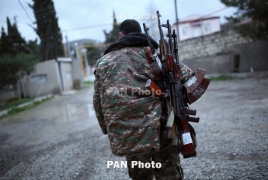Three years have passed since the Four-Day War in Karabakh April 2, 2019 - 10:20 AMT PanARMENIAN.Net - Three years ago this day, Azerbaijan launched a large-scale military offensive across the entire line of contact with Nagorno Karabakh (Artsakh). The clashes which began in the wee hours of April 2 in 2016, lasted four days and were later dubbed the Four-Day War or the April War. The Azerbaijani side initiated major military operations, making use of almost all the types of equipment it possessed in its arsenal. Just like the early 1990s, the entire Armenian nation in Armenia, Artsakh (Karabakh) and the Diaspora united to defend Artsakh. A number of events and protest rallies were organized in various corners of the world, which sought to put an end to Azerbaijan’s aggression against Karabakh. People arranged fundraisers and did whatever they could do to help calm the situation. Later, when it turned out that the Karabakh army did not have a sufficient amount of tourniquets to control arterial and venous blood flow, the Armenian youth jointly set out to purchase the devices from various websites and deliver them to Artsakh. Those in Armenia were actively involved in the process, with people helping however they could to make a difference. To manage irregular cash flows, the Karabakh government opened a special bank account. As a result, around AMD 5.5 billion ($11,4 million) were transferred by 7,903 legal entities and individuals in the period between April 4, 2016 and January 1, 2017. Of particular importance is the major flow of volunteers from Armenia to Artsakh, which included not only Karabakh war veterans but also many young people. Armenia's then president Serzh Sargsyan met the OSCE Minsk Group co-chairs on April 4, 2016 to brief them on the situation along the contact line. The Minsk Group, in turn, convened a meeting the next day in Vienna and released a statement afterwards, condemning the military operations in the conflict zone. In Berlin, the then OSCE chairman-in-office Frank-Walter Steinmeier said: “Reports on the cessation of hostilities are encouraging. Our immediate efforts must now focus on stabilizing the ceasefire and preventing any new escalation. Hostilities must stop in an effective and lasting way. In this regard, I welcome the early visit of the co-chairs to the region. I remain in close contact with the sides and other international actors.” As a result, an agreement on the cessation of hostilities was reached four days after Azerbaijan’s attack, on April 5. In the days that followed, the agreement was chiefly observed, although Azerbaijan initiated unsuccessful subversive attacks. In the four bloody days of April last year, both Armenian and Azerbaijani sides suffered major manpower and equipment losses, with several citizens, including a child, killed in Karabakh. The foreign ministers of Armenia and Azerbaijan, Ararat Mirzoyan and Jeyhun Bayramov, have arrived in Washington. The CSTO budget for the current year requires adjustments due to the refusal of Yerevan to pay their share of contributions. Six total incidents have burned 19 old-growth trees. Friday night 8 trees were torched along the beautiful main entrance. The EU does not intend to conduct military exercises with Armenia, Lead Spokesperson for EU Foreign Affairs and Security Policy Peter Stano says. Partner news |